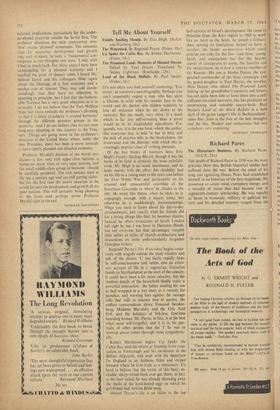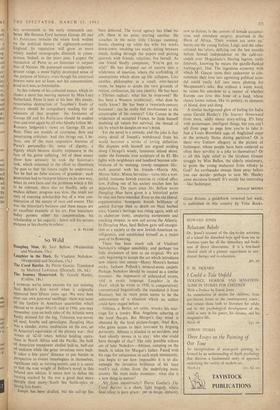Richard Pares
The Historian's Business. By Richard Pares. (O.U.P., 25s.)
THE death of Richard Pares in 1958 was the most grievous blow that British historical studies had suffered since the war. Before the onset of his long and agonising illness, Pares had established himself as an historian of the first magnitude. He possessed an astute mind, exemplary energy, and a breadth of vision that had become rare in eighteenth-century scholarship. He was equally at home in economic, military or plitical his- tory and his detailed interests ranged from the
late seventeenth to the early nineteenth cen- turies. His famous Ford lectures George III and hie Politicians remains the wisest book written on the political history of eighteenth-century England. Its reputation will. grow as more Widely lauded monographs diminish in conse- quence. Indeed, as the years pass, I expect the reputation of Pares as an historian to surpass that of Namier. He possessed sounder judgment. greater range, a more highly developed sense of the purpose of history, even though his analytical Powers were not so keen, nor his concentration, good as it was, so formidable.
In this volume of his collected essays, which in- cludes a short but moving memoir by Miss Lucy Sutherland, Pares is seen at his best. His steady, remorseless -destruction of Toynbee's Study of History should be compulsory reading for all admirers of that prophet : the footnotes of George Ill and his Politicians should be studied over and over again by all who blindly follow Mr. Romney Sedgwick's views on George Ill and Bute. They are models of courteous, firm and Penetrating criticism. And this brings out, I be- lieve, one of the most impressive features of Pares's personality—his sense of dignity, a dignity which became doubly impressive in the face of his grave suffering. All of these essays Show how seriously he took the historian's task, which consisted in the effort to illuminate the past so that the future might be understood. Yet he had no false notions of grandeur : each generation had to interpret history in its own way, select its own facts and the problems which it felt to be relevant; there was no finality, only an endless debate; progress was slow, the result not only of exacting scholarship but of a wise con- sideration of the nature of men and events. This Was the historian's business and these essays are an excellent example of his art. Few historians today possess either his concentration, his scholarship or his sagacity: fewer still his serious Purpose or his charity to others,
J. H. 'PLUMB







































 Previous page
Previous page